
Investigation reveals how the Nigerian Police Authorities have neglected families of officers killed during indiscriminate attacks in Southeast Nigeria.
As most families in Nigeria were planning for Christmas, in December 2020, Inspector Daniel Ise of the Nigeria Police had to prepare for his departure.
He had just been transferred from Akwa Ibom, where he had served for years, to Owerri in Imo State, Southeast Nigeria. His wife and children were unhappy with this development, but Ise was optimistic. He told them he was going to help combat the criminalities plaguing the state.
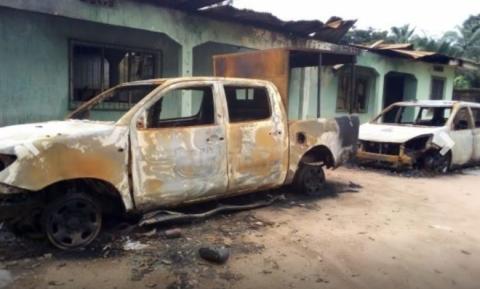
He spoke to his wife about his dream for a better Nigeria and how he wanted a bright future for his children. He also promised to always check on his family in Abia from time to time.

HumAngle learnt that Ise, described as a caring husband and father, kept to his promise of always reaching out to his wife and children — until April 26, 2021.
“We noticed he did not call for two days and we were all worried. We tried calling him, but his line was switched off. After a week, we reached out to some of his friends who told us he was on an assignment and he would reach out to us at home upon his return to the city,” his son, Godwin Daniel, 20, said.
After two weeks, Godwin and his mother, Gift, went to Owerri to make enquiry at the police headquarters and were told he was on special duty.
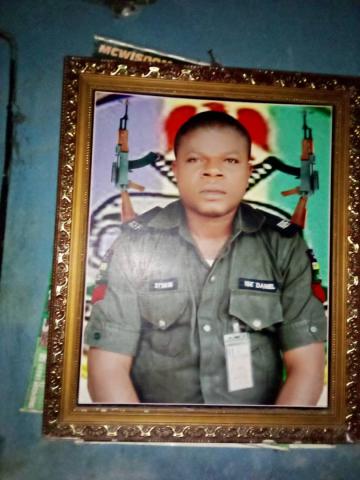
“We insisted that we were not going to leave. The junior officers then took us to a top official who confirmed that my father was killed in one of the attacks on police officers and their facilities. We were then told to go to the mortuary at the Federal Medical Centre,” he said.
The police under attack
There has been a rising wave of attacks on police stations and officers in some southern states in Nigeria in the last few months.
These attacks, based on a study of various reports, have led to the death of nearly 200 police officers in the last eight months. The affected states include Enugu, Ebonyi, Anambra, and Imo.
While the Nigeria Police and the Federal Government have repeatedly blamed a secessionist group, the Indigenous People of Biafra (IPOB), and its militia for the attacks, there has been no independent confirmation of this.
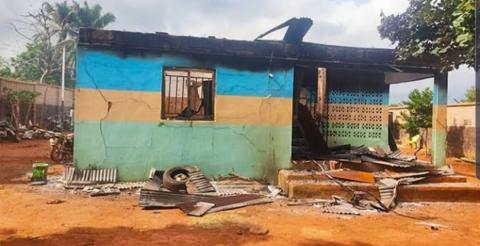
Security analysts have argued that the attacks on police officers and their facilities in the region is part of the general insecurity affecting Nigeria.
HumAngle’s findings show that Imo has the highest number of police killed between December 2020 and June 2021.
The state government recently released a list of 21 officers killed, their divisions, and the contacts of their relatives. One of them is Inspector Ise.
Soon after Godwin and his mother were told about Ise’s death, police authorities advised them to plan for his funeral and start processing his death benefits. Despite completing the process in time, the family have still not received a kobo.
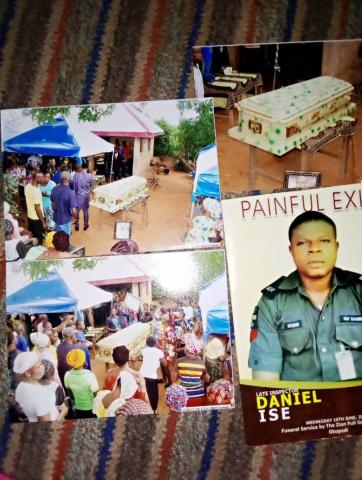
“I told the DPO that we didn’t have money to pay the mortuary to release his body, but he responded that the police do not also have money to cater for that. My mum is jobless and was pregnant then, so I had to rally round to get the money.”
“We reached out to the police after his body was released so they could escort us home but the DPO told us there was no officer to do that because the ‘gunmen’ might attack them again. I paid over N150,000 to ensure that my father’s corpse got to Abia in a hired vehicle. We eventually buried him on June 16,” Godwin said.
Since he graduated from secondary school in 2011, Godwin has been riding an okada to help his father support the family. Now the responsibility has fallen to him and the police authorities have not stepped up to help.
“The police force disappointed my family and I won’t pray for anyone I love to work with them,” he said.

Ise’s widow, pregnant before his death, gave birth to a baby girl on Sunday, Aug. 22. This brings the number of her children to seven: four daughters and three sons. Godwin told our reporter that “things have been really bad because the family is in debt. My younger ones have also been forced to stop going to school.”
Jungle of guidelines
Guidelines on the administration of police officers’ pensions provide that death benefits should be paid to Next of Kins (NOKs) of officers who die in active service.
According to the Police Pension Department (PPD), when this happens, the families are expected to submit a letter of introduction of NOKs from the command where the officer last served, a death certificate, the deceased officer’s bank statement, stamped and signed NUBAN compliance bank Statement with bank logo, one bank account for the widow, and another bank account opened in the name of the youngest child for children who have not attained the age of 18 years.
Other required documents are a comprehensive police investigative report indicating the nature of the duty being performed at the time of the officer’s death, and photocopies of birth certificates or sworn declaration of age of not more than six children with a passport photograph for each attached.
Afterwards, a Standing Committee invites the NOKs to verify their claims and validate the submitted documents. When satisfied, the committee usually sends the NOKs with their files to the computer section for biometric data capturing.
Section 6 of the guidelines states that “the deceased police officer’s entitlements are to be paid to his Next-of-kin (child/children and the wife). Apart from the gratuity, the widow and the children (maximum of six) are entitled to monthly pensions, one-ninth of his accrued pensions until each of the child attains 18 years of age or death, one-third of his accrued pensions for the widow if she remains unmarried and of good character.”
The rule is, however, silent about how long the process should take, making it difficult to hold the Nigeria Police accountable as families of slain officers continue to live in hardship months or years after completing the process.
Sources in the force told HumAngle the police authorities hide behind the loophole in the guidelines to delay and embezzle funds meant for affected families.
“The guys at the pension unit of the Police Force are culpable when it comes to this,” said an Assistant Commissioner of Police who pleaded anonymity because he was not authorised to speak.
“They sometimes compromise the process and make payments difficult, and this is because the guidelines leave a lot of loopholes. There are cases where they don’t even process anything except the family members promise to give them a cut from whatever is paid. When this agreement is made, they fast-track the processes.”
Many families neglected
Ise’s family is not alone. For Elizabeth Joseph, the pain of losing her husband, Sergeant Kombe Joseph, still resonates. He was killed in a Feb. 5, 2021, attack of Umulowo Police Division, in the Obowo Local Government Area of Imo State.
HumAngle learnt that late Kombe had been a police officer for only two years before he was killed. Now, despite submitting all required documents, his widow and three children are still indigent and struggle for daily bread.
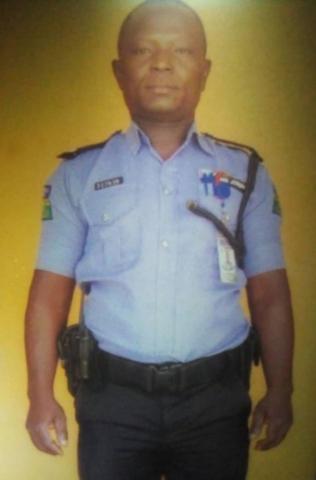
“We were married for eight years before his death. Maybe my husband would have survived like others, but he stayed back to save the lives of his colleagues,” said Elizabeth.
“I was told that when the gunmen attacked the division, others ran into the DPO’s office but my husband broke the back door to make way for others to escape. He was firing at the gunmen until his bullet finished.”
“They took him to a local mortuary and I got the news after two days. He was eventually buried in his state, Gombe, on Feb. 18, 2021.”
“Since then, the police have neglected the family and my three children are suffering because the pressure is too much on me. Only his friends are helping us with stipends. My husband sacrificed for others to live and nobody cares about us. The DPO has not even called,” the distressed widow continued.
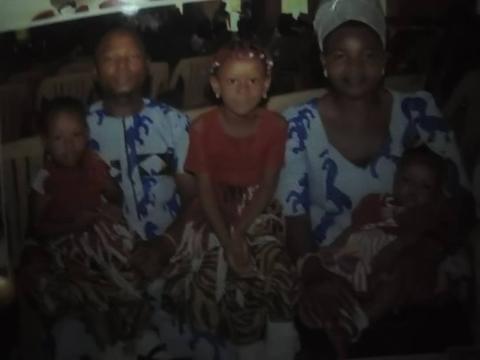
Also, the death of the Sergeant Augustine Anyawu, killed by a terror group on Jan. 13, has left his wife Agnes Anyawu, in anguish. They only just got married in 2017 and were looking forward to spending the rest of their lives together.
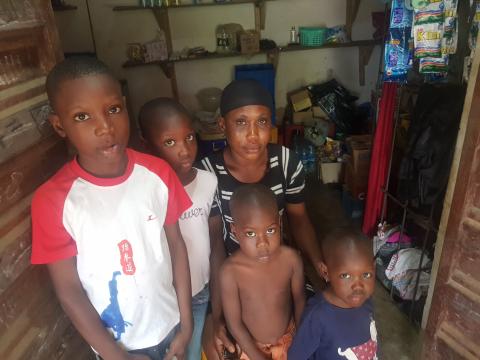
Agnes told HumAngle that Augustine fulfilled all his promises including trying his best to cater for their four children. Seven months after his death, his children can no longer attend school.
“He was collecting N45,000 as salary before he was killed and he tried his best to meet the needs of the family. I have long submitted all necessary documents to claim his gratuity in early February, but nobody has reached out. I am only praying for God’s intervention,” lamented the widow, who now lives with her children in a 5×6 ft shop.
Kelechi Obilionu has a story of loss and neglect that is all too familiar too.
She told HumAngle that her husband, Sergeant Loveday Obilionu, was in a vehicle with a friend on June 18, 2021, when they were accosted by armed men in military uniform and shot. The assailants dumped their bodies in a drain and left with the vehicle.
“I called his number at about 9:00 p.m. and a stranger said my husband was killed by the back gate of the Imo State University,” she said. “Life has been meaningless since then. The police did not show empathy.”
Her three daughters, nine, seven, and four years old, have been asking for their father.
“I had no choice but to tell them he was killed on duty and betrayed by the police authorities who refuse to take care of the family,” she said.
Police ‘coerce families of slain officers’
During the period of this investigation, our reporter reached out to over 15 families who lost loved ones in the last eight months. Many of them were warned not to speak to journalists, HumAngle gathered.
“I can’t speak with you again as planned. My husband’s DPO has warned me not to speak with the press on the matter if we really want to get my husband’s gratuity,” a widow disclosed.
“My husband was among those killed in December 2020. I submitted the documents required for his gratuity and pension on Jan. 5, 2021, but we’ve not heard anything. Nobody cares about the widow and children of the slain officers and that’s not good enough.”
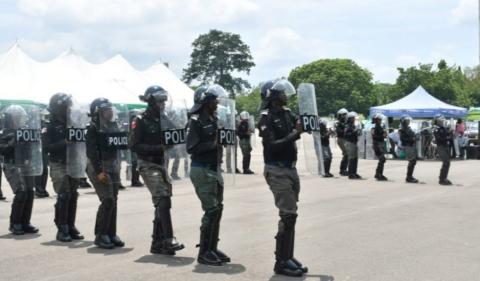
Another widow was coerced into setting up our reporter in Owerri. She had earlier declined granting an interview but called back hours later. Upon getting to her house, HumAngle’s reporter was arrested by five police officers and was driven to the state’s police headquarters for interrogation.
It took the intervention of the police spokesperson in the state, Michael Abattam, before our reporter was released hours after his arrest.
A week after our reporter returned from Imo, one officer, coincidentally among those involved in the arrest, was shot dead by assailants when his squad was ambushed by gunmen in the state capital, one officer at the command told HumAngle.
“We are tired of these killings. I lost one of my boys again,” the officer, who asked to be anonymous, said. “We are forced to fight criminals with rickety patrol vehicles, and poor weapons making us vulnerable to attacks.”
Only police can speak for the families?
After his release, our reporter proceeded to the office of the spokesperson for a scheduled interview but was directed to the office of the Deputy Commissioner of Police, Chineru Oko. Oko told HumAngle that “only the police can speak for the widows of slain officers.”
“We appreciate your intentions but the police force system is rigid in such a way that it may even implicate us if we provide you with information without the approval of Force Headquarters. We can’t speak on this except there’s authorisation from above.”
Oko asked our reporter to wait for the state’s Commissioner of Police, Hussaini Rabiu, if not pleased with his response. Ten hours of waiting later, he was told he could not see him without “authorisation from Abuja.”
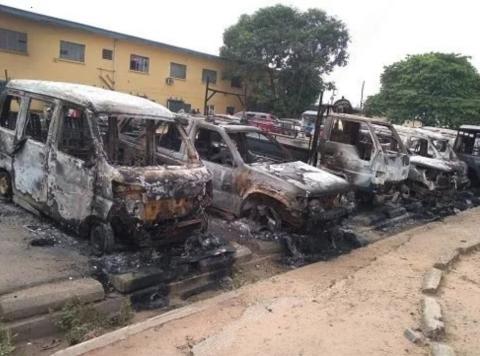
Our reporter also visited the officer in charge of pension and gratuity but he was unavailable. HumAngle later reached out to the police officer who simply identified himself as Officer Obi on the phone.
“I have no power to tell you about happenings in the police force,” he said.
For two weeks, the Nigeria Police Public Relations Officer, Frank Mba, did not respond to repeated calls and text messages seeking his comments on the matter.
Poor welfare scheme
The Nigeria Police Welfare Insurance Scheme is designed to compensate members of the force who might have suffered accidents, injury, or death in the course of their duty.
While the Police Act and the pension department are silent on this, a top police source told HumAngle every officer is entitled to insurance cover, adding that the process is, however, marred by various irregularities.
Our correspondent learnt that the insurance cover available include the IGP Family Welfare Package, Group Life Assurance Package, Group Personnel Accident Insurance, and Nigeria Police Welfare Insurance Scheme Package.
Multiple sources revealed that the packages are beset by problems ranging from outright corruption to poor planning and embezzlement of welfare funds, poor post-retirement funding administration, and inadequate buildup of funds.
A former spokesman of the police force said under anonymity, “There is a policy for insurance but it is not workable. We only have some of these things on scattered papers and not in a formalised document. In fact, most police officers do not know about the process. The insurance of the police is marred with corruption and a lot of hidden information not available to the public.”
He also said widows of slain officers may wait for five years or more before getting their husbands’ gratuities.
An officer in charge of police pension in a southwest state also said, “I am at the pension department but I can tell you for free that the police authorities do not deal fairly with widows. I know the number of cases I attend to and the pains of widows and their children, but I have no power to pay them except if it is done from Abuja. There is favoritism and nepotism, a treatment demoralising most officers still in active service. The insurance plan is not workable.”
Concerned about the spate of dastardly attacks on police officers, the Governor of Rivers State, Nyeson Wike, recently asked the Federal Government to put in place a workable life insurance scheme for all police personnel.
Last month, Governor Hope Uzodinma of Imo State introduced a life insurance policy for officers in the state. He added that a social welfare package would be launched to motivate them and enhance their individual and collective service delivery.
The President of the Police Officers Wives Association of Nigeria (POWA), Hajara Baba, in July also advocated for the welfare and healthcare needs of wives of officers of the Nigeria Police.
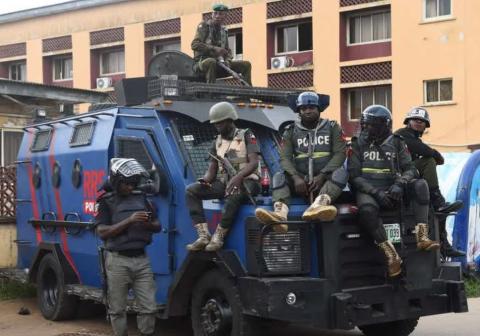
Failed promises
Earlier this year, an ex-commissioner of police in Imo, Abutu Yaro, said the sacrifices made by murdered officers would not be forgotten.
The Command was, however, silent when HumAngle queried them on their inability to pay promised burial expenses and other entitlements of slain officers to their families.
Speaking with HumAngle, Okechukwu Nwanguma, the Executive Director of Rule of Law Accountability Advocacy Center (RULAAC), knocked the police force, saying there is culture in the system that does not care about the welfare of officers.
“I have done a lot of work on this and I feel bad seeing the condition of police officers alive, let alone their widows. I have seen police officers injured in the course of duty and they were neglected by police authorities.
“The IGP and other top officials make promises, but nothing is always heard. The corruption in the police system is appalling. They are heartless and they perfect the act of stealing entitlement of slain officers.
“Some of the widows of the slain officers are even sometimes sexually exploited as conditions to release the entitlement of their husbands. When police die here, they die for nothing. This is killing the morale of officers. They don’t care for them at all beyond failed promises.”
On the way forward to the menace, Nwanguma said there is need for total reform of the system.
“Unless the government is genuinely interested in improving the welfare, neglect of police officers and poor funding, no change is expected to happen,” he said.
A gender equality advocate, Karimot Odebode, told HumAngle that “these police officers dedicated their lives to the service of humanity; hence, the welfare of their widows and children should not be neglected.”
“Former presidents and governors get paid even after leaving the office, yet we neglect our officers,” she pointed out. “It is sad that police authorities turned their back on families of officers who ordinarily would have catered for them if alive. We should do better as a nation.”
This story was produced in partnership with Civic Media Lab under its Investigative Reporting Project.